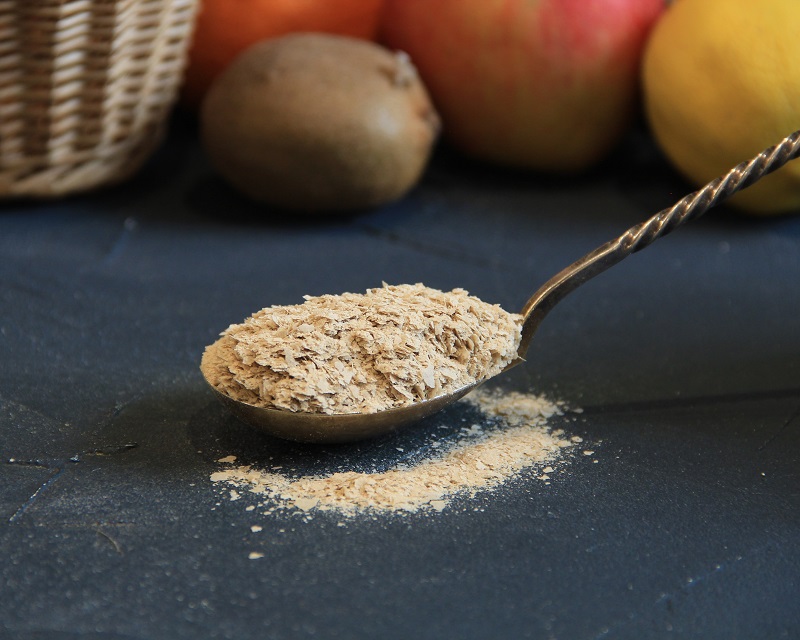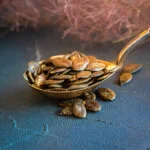Nutritional yeast flakes
From 3.30€
Nutritional yeasts have taken the culinary world by storm. Deactivated nutritional yeast has become a staple in the diets of vegans, vegetarians and health-conscious individuals.
What is deactivated nutritional yeast?
Deactivated nutritional yeast, like brewer’s yeast, comes from the Saccharomyces cerevisiae species. However, during the production process, the yeast is switched off, making it inactive. This deactivation takes place through heat treatment, which preserves their nutritional profile but stops the fermentation process. The result is amazing, this yeast has a cheese-like flavour, making it an excellent substitute for milk and cheese in a plant-based diet.
Benefits of nutritional yeast
Rich in B vitamins: Deactivated nutritional yeast contains essential B vitamins including B1, B2, B5, B6 and B9. These vitamins play an important role in energy metabolism, nerve function and general well-being.
Vitamins per 100 g, (Daily Intake)
Vitamin B1 – 1.4 mg
Vitamin B2 – 3.1 mg
Vitamin B6 – 4.3 mg
Folic acid – 26 mg
B5 (Pantothenic acid) – 7.2 mg
Folic acid – 33,1 µg
Phosphorus – 1062 mg
Zinc – 12,3 mg
*100 g for an average adult reference intake (8,400 kJ/2,000 kcal)
Calculated in accordance with Regulation (EU) No … 1169/2011;
Protein source: contains all nine essential amino acids, making it a valuable protein source for vegans and vegetarians.
Possible side effects
Deactivated nutritional yeast is safe for most people when used in moderation. However, as with any new food, some people may experience minor side-effects such as digestive problems or allergic reactions. For those with health problems, especially digestive or intestinal, it can sometimes worsen symptoms. Be careful.
Using deactivated nutritional yeast
The culinary versatility of nutritional yeast makes it a favourite ingredient in many plant-based cuisines.
Savoury seasoning: sprinkle the yeast on crackers, roasted vegetables or pasta dishes to add a cheesy flavour.
Vegan cheese sauce: create a creamy and delicious vegan cheese sauce by mixing nutritional yeast with plant milk and spices. Use as a sauce for a variety of dishes.
Add to food: add nutritional yeast to soups, stews or salad dressings for a richer flavour.
Plant-based protein: add to your smoothies or salads by sprinkling a little on top.
Nutritional yeast is a culinary gem that adds both flavour and nutritional value to your food. Nutritional yeast is sold as flakes, granules or powder. Naturally low in calories, sugar-free, gluten-free and 100% plant-based.
Whether you’re a follower of a plant-based lifestyle or just want to improve your diet, this amazing ingredient is sure to conquer your taste buds. Remember to choose a high quality organic product and enjoy its health benefits.
As with any dietary change, listen to your body’s reaction and enjoy the creativity in your kitchen.
There is no strict daily intake of nutritional yeast, but the usual rate is around 1-2 tablespoons (15-30 grams) per day for most adults. This amount may vary according to individual dietary needs and preferences.
Sources:
https://www.healthline.com
https://www.medicalnewstoday.com
NOTE. The information contained herein should not be interpreted as a recommendation for treatment or other health issues.We encourage you to make personal health decisions based on a variety of sources of information.
Nutritional yeast flakes 100%
Energy and nutritional value per 100 g
Energy 1426 kJ/ 341kcal
Fat - 6.4 g
- of which saturates 1.2 g
- of which monounsaturates 5,1 g
- polyunsaturated fatty acids - < 0,1 g
Carbohydrates - 9,1 g
- of which sugars - 0,2 g
Fibrous matter - 27,1 g
Protein - 48,1 g
Salt - 0,2 g
Store in a dry, cool place.


